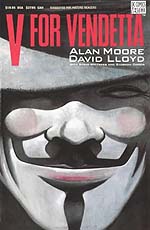the Gunpowder Treason and Plot,
I know no reason why the Gunpowder Treason
Should ever be forgot.”

Alan Moore, as is generally typical of the revered graphic novel author, had his name removed from the film incarnation of his V For Vendetta, released by Warner Bros. on March 17. In hindsight, it was a wise decision, and when the credits appear, reading merely “Based on the graphic novel illustrated by David Lloyd,” one can breath a brief sigh of relief that the rather shallow attempt at invoking Moore’s ideas does not find itself in the company of his screen credit.
The only Moore adaptation that has afforded the slightest amount of appreciation was the Hughes Brothers’ “From Hell” in 2001. That Johnny Depp vehicle, however, still missed the opportunity to plumb considerable depths found in that bracing and heavy piece of literature. But we can always forgive such things somewhat, as an Alan Moore work is in and of itself too dense for cinematic interpretation.
And so why should I be so hard on James McTiegue and the Wachowski Brothers for their troubling adaptation? What stands out clearly is the raping of the source material’s tone. By no means an actioner on the page, the Wachowskis have turned V For Vendetta into a pseudo-Matrix with typical pseudo-philosophical discussion and intent that plays flat compared to the exuberance Moore’s imaginings offered. What was left on celluloid was, fittingly enough, pseudo-Moore.
As the press notes for the film note, “V For Vendetta first appeared in Warrior, an independent monthly comic magazine published in 1981.” The story very quickly generated a cult following of fans foaming at the mouth for each installment. The story ran 26 issues before Warrior disintegrated, and there was a five year gap before cliffhanging fans were able to satisfy their craving. Moore and Lloyd completed the tale in its entirety in a graphic novel under the DC Comics banner in 1989, finally drawing V and Evey’s drama to a definitive close.
Moore used his portrait of a totalitarian Britain as a means to artistically indict the highly conservative government of Margaret Thatcher in 80s Great Britain. Considerably deeper and more human than the most celebrated of Moore’s works (Watchmen and From Hell certainly among them), V For Vendetta is an investment of the soul and a reading experience like no other.
David Lloyd’s illustrations are both striking yet anonymous in their representation of a host of characters (minutely represented in the film), while the visual framing of the imagery is textbook Moore. The anti-hero, V, is ever daunting both in word and in appearance, while Evey’s innocence is darkly put on display, traveling from naiveté to wayward, cultured spirit.
Starring in the film version of the tale is Natalie Portman, called to task as Evey in a role that would have been better-served by an unknown, despite Portman’s considerable talents, while V is assigned to Hugo Weaving of “The Lord of the Rings” and “The Matrix” franchises.
For his part, Weaving tries his hand at controlling the film through an entirely vocal performance, and I’d wager he affords more to the task than any other actor might have. The ever-too-apparent need of the filmmakers to personify V keeps his performance at arm’s reach from the domineering persona roaming the pages of the graphic novel, though it is at the same time that very inclination to place a face on terrorism (thematically) that represents the wisest avoidance of the source material.
The periphery of totalitarianism is speckled with the likes of John Hurt, Stephen Rea, Roger Allam and Tim Pigott-Smith. All are dreadfully diluted both on the (screen)page and in performance.
It seems that no filmmaker of any caliber will ever be able to represent the imagination of Alan Moore on the big screen in a manner befitting his unique consciousness. He reached the pinnacle of graphic literature, the cinema’s long lost cousin, to the point that he transcends the medium with his very participation in it.
Moore’s epic saga Watchmen was recently placed into turnaround by Paramount and now finds itself under the Warner Bros. umbrella like all DC products. One can only hope that, if a Watchmen adaptation must unfold in the annals of filmmaking, that those involved are up to the task. Director Paul Greengrass was a valiant step in the right direction during the Paramount era, but it is left to be seen what Warners does with the material.


Comments